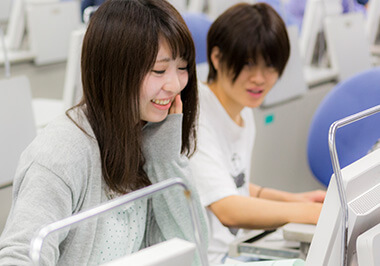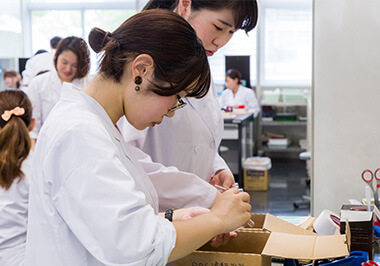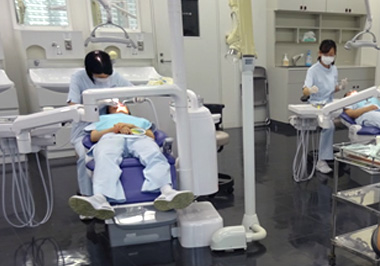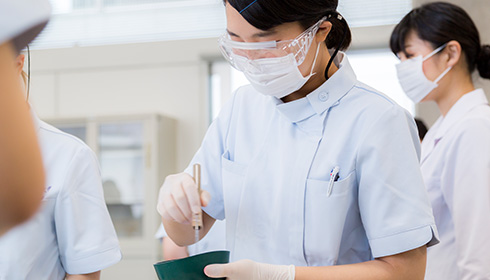Links
Behavioral Sciences
Health Informatics
Discovering what's beyond health
It's said that health is important. But what exactly does "health" refer to? Healthy living is not defined with reference values, but rather, we believe, is about pursuing life they feel represents them. In order for society to become a place for any of its members to be happy, professionals possessing extensive knowledge and skills of utilizing it are in need. The Health informatics Division was founded following such demand. This division fosters generalists with knowledge of diverse themes pertaining to health, who can communicate with professionals of different fields. SPU prioritizes invariable liberal arts because the division is unrestrained from existing fields. In other words, the division represents the framework of knowledge that accurately cuts out the necessities after looking around the realities. We are in an age where "answers" to any questions are instantly available with search engines. But at the same time, determining what is correct and what isn't has become increasingly difficult amid the infinite amount of health-related information available to us.

This is why we are starting to realize the importance of going back to the basics, like precisely reading information, deliberating on them, and explaining the contents with our own words. Health informatics
is still a new academic field, but there is much knowledge that will be generated by multiplying various experiences. Let's repeat trials and errors, ask many questions, and spend your four years together with us at SPU.
Laboratory Sciences
Laboratory Sciences
Developing health science from biological information
This division educates students to become "specialists who develop health science from biological information," understand the responsibilities and roles of clinical tests in the medical field, and be capable of applying the latest clinical testing technologies that evolve every day.
Today's clinical testing is gaining presence in terms of early detection and recurrence prevention of illnesses, in addition to assisting disease diagnosis in hospitals. Medical technologists are now working in locations other than hospitals, including testing centers, health examination centers, public health centers and clinical trial companies.

Following this situation, this division places particular focus on the following capabilities to educate students to be medical technologists who will contribute to local communities with the following values and capabilities:
- Ethical and humanitarian values with broad perspectives and respect of each person's dignity as a medical professional
- Capabilities to systematically master basic knowledge and techniques necessary in clinical testing, perceive test data scientifically based on those knowledge, and theoretically and holistically run analysis with independence
- Capabilities to understand the missions and roles of medical technologists, collaborate with people of different backgrounds and contribute to medical science
- Capabilities to sustainably contribute to society with testing technology by perceiving the health of people from global standpoints.
Oral Health Sciences
Oral Health Sciences
Specialists who promote health through oral science
While concerns toward dental health are rising, many people lose close to 20 of their teeth by the time they reach age 80, which will cause hindrance to everyday life.
Demands for measures preventing dental diseases, subsidies for dental examinations and demands for dental hygienists who provide oral health guidance are all on the increase, and the ability to provide quality service while collaborating with other professions and grasping the issues involving physical and mental health is in need.

This division, together with the Behavioral Sciences and Laboratory Sciences divisions, educates students to become specialists who promote health through the oral science realm through learning the divisions' common life science framework and pursuing the health of people from broad perspectives.
The curriculum features specialized subjects that focus on the understanding of oral diseases and oral health care so that students will be able to meet societal needs and provide sophisticated oral health care.
Students go through practicum and training in dental clinics, elementary schools, facilities for people with disabilities, and other locations to improve their practical abilities.
The Department of Health Sciences' Policies
The Department of Health Sciences' Policies

Department Policies
Read about the Department of Health Sciences' curriculum and diploma policies. (Japanese)
Qualifications that can be acquired
Qualifications that can be acquired
Examination pass rates
Examination Pass Rates
Division of Laboratory Sciences
2018 National Examination for Medical Technologists Pass Rate:
95.2%(National average:86.5%)
Division of Oral Health Sciences
2018 National Dental Hygienists Examination Pass Rate:
100%(National average:97.6%)
Messages from students and alumni
Messages from students and alumni